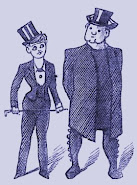Down the Bunny Trail
Rick Marschall
I have
just returned from the 14th annual Symposium of the Theodore
Roosevelt Center at Dickinson State University. I recently was named their Cartoon
Archivist, as noted here, and indeed the keynote was a “Cartoon-Off,” with the
honorable Clay Jenkinson and myself showing 15 cartoons each, commenting, and
inviting the registrants’ votes.
Among
many things to which my “mind” raced back was not Roosevelt specifically, but
peripherally:
When I
was very young I already had twin obsessions – more than a couple, really – but
two were Roosevelt and vintage cartoons. My mother’s mother was born in New
York City of German parentage. She moved from Manhattan when young and quickly
acquired and never lost a Brooklyn accent. “Berl the water” and “Don’t get boined,”
were such footprints of speech.
Perhaps
her ears were affected, too; or maybe my famously quiet voice, but one day in
the kitchen I wanted to ask if she ever laid eyes on Theodore Roosevelt in her
youth. An “excuse me” and a “what?” and
“speak up” had me repeating “Theodore”… until she thought I was asking if she
attended the theater as a girl.
An
unconscious shift to my second interest. Her face lit up, and she recalled
being taken to a Broadway musical as a girl. It was one of several musical
comedies staged around the pioneer comic-supplement character Foxy Grandpa. She
didn’t remember much about the plot or the songs… but she remembered that there
were moments so funny that a fat man sitting on the aisle laughed and laughed.
“His face
turned so red when he laughed that I thought he was going to pop!” she told me.
So that was tattooed on my memory, too, and through years since I cannot think
of Foxy Grandpa and his two grandsons without thinking of little Augusta Vagt
watching that man almost laugh himself to death.
Foxy
Grandpa commenced
in 1900 in the color pages of the Sunday New York Herald. The artist was
Carl Emil Schultze, who had signed his cartoons in Life magazine with
his surname, but his newspaper work as “Bunny,” often beside a furry
mascot. His other features for the Sunday funnies were random gags or short
strips under the title Vaudevilles, and were collected in a book of that
name.
An
immediate hit was Foxy Grandpa. Its premise was simple – indeed, a
one-gag premise. Oddly enough, the early strips virtually all were variations
on a single joke. Happy Hooligan was a well-meaning tramp whose kindly efforts
backfired. Hans and Fritz would conspire, execute a prank, and be punished. Little
Jimmy was distracted from every errand, with comic results. Buster Brown’s
pranks went awry on their own. Maud the Mule kicked people – usually her owner,
Si – into the next county to assert her dominance. Alphonse and Gaston’s politesse
inevitably resulted in chaos, not order.
… and so
on. In all, a remarkable but ironic foundation for commercial successes and a
viable and pliable art form. Yet such was the early days of the comics. Foxy
Grandpa’s formula was, simply, the mirror-image of the Katzenjammer Kids.
The grandsons plotted a trick on the old boy, who predictably outsmarted them
in the ultimate panel. It is amazing that for almost 20 years the boys were
surprised each week. And each week.
And in
various formats, appearances, books, and Broadway musicals. As far as I have
seen, or remember (having the complete run in the Herald and Hearst’s American
to which he moved amidst much fanfare soon afterward; and ultimately to
Munsey’s Sun) neither Grandpa nor the boys had Christian nor surnames.
Neither “Little Brother” who eventually joined the cast. No intermediate
generation of parents were ever seen, beginning tradition that a homonymic
namesake, Charles, continued. (On stage, Grandpa had a name: Goodelby Goodman;
and the boys were Chub and Bunt.)
I will
share here memorabilia including buttons and songsheets generated by the stage
sensations. Not pages nor reprint-book covers here; maybe later.
“Bunny”
had a sad ending to his life and erstwhile successful career. He died in
poverty in New York City’s West side in 1939, filling his last years with
occasional pages for early comic books, a couple of children’s books, and
drawing sketches of Foxy Grandpa for neighborhood businesses and kids.
53























No comments:
Post a Comment